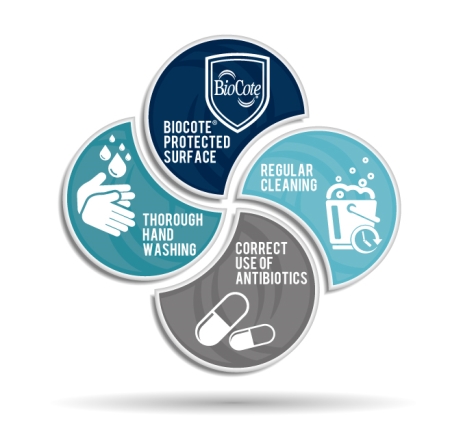With Public Health England recently predicting that increasing antibiotic resistance could lead to 10 million deaths by 2050 worldwide, plus leading economist, Lord Jim O’Neill, saying it could also cost the global economy $100trillion by 2050 – a well-respected doctor of microbiology has stressed the unique benefits of antimicrobial technology as part of the wider solution to cross contamination in healthcare environments.
Dr Michail Karavolos is the new technical manager at antimicrobial solutions provider, BioCote, and he told decisionmakers at the latest Healthcare Estates Management Conference that reducing healthcare-associated infections (HCAIs) and antibiotic resistance can only be achieved by NHS estate managers being more open to technology that provides innovative property solutions.
Common disinfectants have limited residual effects and bacterial populations are rapidly displaying increased resistance to them
The current HCAI regime of infection prevention and control strategies, which includes hand hygiene, cleaning and training procedures, has long proven to be ineffective - with 16 million extra days of hospital stay required according to the World Health Organization (WHO); and 37,000 attributable deaths in Europe each year, according to statistics from the European Centre for Disease Prevention and Control), plus annual financial losses of approximately €7billion across Europe.
What’s more; the typical built environment is playing a major part in spreading the infection.
Dr Karavolos said: “Healthcare settings, particularly, along with other highly-populated environments, are a breeding ground because of shared facilities and enclosed environments, circulated air, common contact surfaces and extended mixing.
“Common disinfectants have limited residual effects and bacterial populations are rapidly displaying increased resistance to them.
“BioCote antimicrobial technology, meanwhile, makes all kinds of surfaces inhospitable to pathogenic microorganisms.
Silver ions, especially with their very-high efficacy and non-toxic properties, can be manufactured into a wide range of materials, including plastics, polymers, paints, textiles, fabrics, ceramics, paper, board and many other materials
“The silver-ion-based technology has no specific site of microbial attack, making evolution of resistance extremely difficult.
“Additives are simply introduced during the manufacturing process and exert, by either chemical or mechanical means, a negative effect on any contaminating microbe causing them to die.
“Silver ions, especially with their very-high efficacy and non-toxic properties, can be manufactured into a wide range of materials, including plastics, polymers, paints, textiles, fabrics, ceramics, paper, board and many other materials.
While BioCote technology doesn’t remove the need for regular cleaning, it is the best complementary strategy - with integrated antimicrobial protection providing a much more comprehensive and robust solution to contamination within hospitals, schools, care homes and an array of other environments.”
BioCote Silver Ion Antimicrobial Technology has a multi-modal action and is effective against a wide range of leading superbugs including MRSA and ESBL-producing E. Coli, Clostridium difficile and Klebsiella pneumonia, plus carbapenemase-producing Enterobacteriaceae (CPE), destroying up to 99.99% of bacteria, fungus, mould and even viruses like H1N1 through proven protein and oxidative damage, membrane disruption, and DNA interference.
“Along with Acinetobacter and Pseudomonas, CPE has been classed as the most-critical group of bacteria by WHO because it poses a particular threat in hospitals, nursing homes, and among patients whose care requires devices such as ventilators and blood catheters,” said Dr Karavolos.
“CPE also encompasses the likes of Escherichia , Shigella and Salmonella and having been evidenced to survive for many months on hard surfaces can cause severe, sometimes-deadly, infections like septicaemia and pneumonia. Plus, hospital mortality rates are currently between 40-50%, further lending to CPE’s alarming title of ‘seriously emerging infectious disease’.
“With the numbers of antibiotic resistant bacteria continuing to grow, current methods to control multi-drug resistant pathogenic bacteria are increasingly limited.
“However, BioCote Antimicrobial Technology can successfully be combined with thorough handwashing practices and regular cleaning to minimise cross contamination and become an essential and pro-active element of healthcare infection control.
“Because it does not wear out or wipe off surfaces, it can provide a continuous decontamination effect and in a ‘live’ 18-month hospital case study, BioCote antimicrobial protected materials regularly demonstrated reductions in bacteria of up to 99%.
BioCote Antimicrobial Technology can successfully be combined with thorough handwashing practices and regular cleaning to minimise cross contamination and become an essential and pro-active element of healthcare infection control
“Indeed, results also indicated lower numbers of bacteria on other untreated surfaces too, due to the fact there are fewer bacteria being transferred – so using a number of antimicrobial objects in hygiene conscious settings even helps decontamination of the wider environment.”
With BioCote Antimicrobial Technology there are significant decreases in microbes in just 15 minutes and reductions of up to 99.5% are achieved in two hours.
It works continuously and will last for the functional lifetime of the product and help maximise existing hygiene processes.
“It’s stable and will not negatively affect product appearance or performance, plus it’s environmentally and ecologically acceptable and completely harmless to people”, Dr Karavolos told the conference.
“It’s surprisingly cost effective and affordable too – simply integrated into any product or surface at the time of manufacture.”

The tehcnology can be combined with handwashing practices and regular cleaning to minimise cross contamination in healthcare environments
